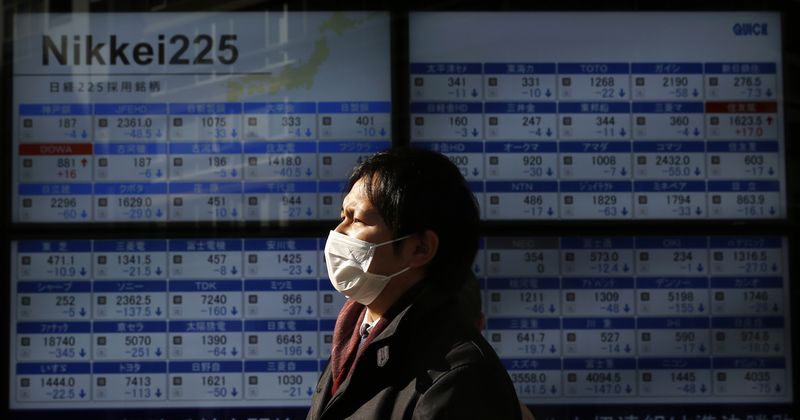This post was originally published on this site
https://i-invdn-com.investing.com/news/LYNXMPEB14010_M.jpg
Investing.com – Asia Pacific stocks were mostly down on Tuesday morning as Apple Inc (NASDAQ:AAPL). reportedly plans to slow down hiring and spend next year to cope with a potential economic downturn.
Japan’s Nikkei 225 rise 0.78% by 10:02 PM ET (2:02 AM GMT). Bank of Japan Governor Haruhiko Kuroda appears more determined than ever to weather political and market pressure in quest of sustainable inflation.
South Korea’s KOSPI fell 0.36%.
In Australia, the ASX 200 edged down 0.15%. Reserve Bank of Australia releases July minutes on Tuesday.
Hong Kong’s Hang Seng Index was down 1.05%.
China’s Shanghai Composite was down 0.21% while the Shenzhen Component edged down 0.18%. China officials may allow homeowners to temporarily halt mortgage payments on stalled property projects as authorities are trying to prevent a crisis of confidence in the housing market.
Apple Inc. is reportedly to slow hiring and spending growth next year in some divisions to address a potential economic downturn as people are concerned about an economic downturn after aggressive monetary tightening.
“We’re in a period over the next couple of weeks where corporate headlines are really going to drive market activity,” Anthony Saglimbene, global market strategist at Ameriprise Financial Inc (NYSE:AMP)., told Bloomberg. He said the focus is on how labor and input costs and demand are shaping the outlook.
Also on the investor’s radar is a gas supply to Europe amid a standoff with Russia over its invasion of Ukraine. The Nord Stream 1 pipeline IS scheduled to reopen Thursday following maintenance.
Overall market volatility is from efforts “to gauge whether we are seeing, one, peak inflation and two, peak interest rates,” Lale Akoner, strategist at BNY Mellon (NYSE:BK) Investment Management, told Bloomberg. She expects the US dollar to remain higher for the next six months.
Market volatility caused by the Russian invasion of Ukraine, along with rising interest rates, U.S. banks have started taking a hit on their leveraged loans’ exposure as the outlook for dealmaking turns sour.
“The market turmoil and abrupt slowdown in the second quarter sparked a downturn in the leveraged finance markets, causing a number of the deals across various market participants to get marked down,” Bank of America (NYSE:BAC)’s chief financial officer, Alastair Borthwick, said on an earnings call on Monday.

